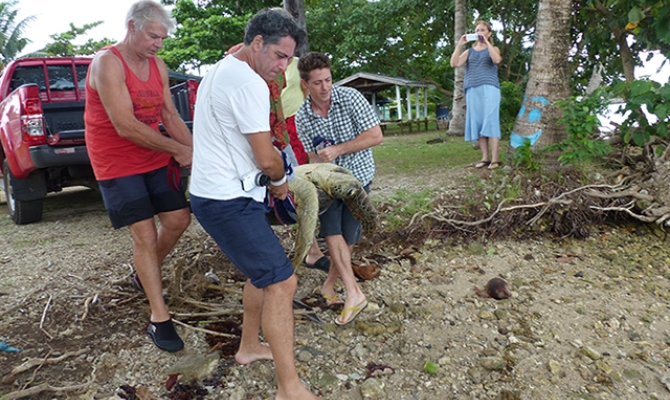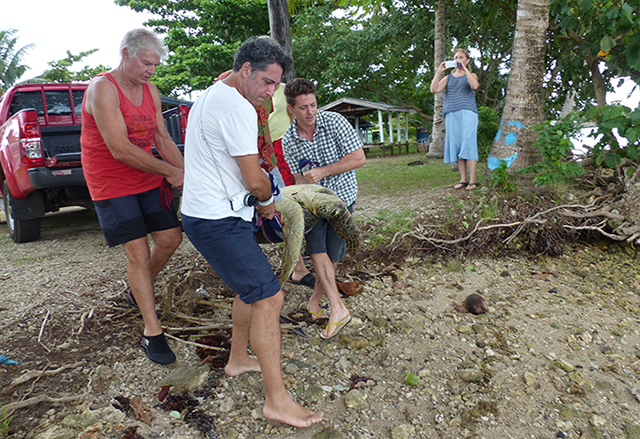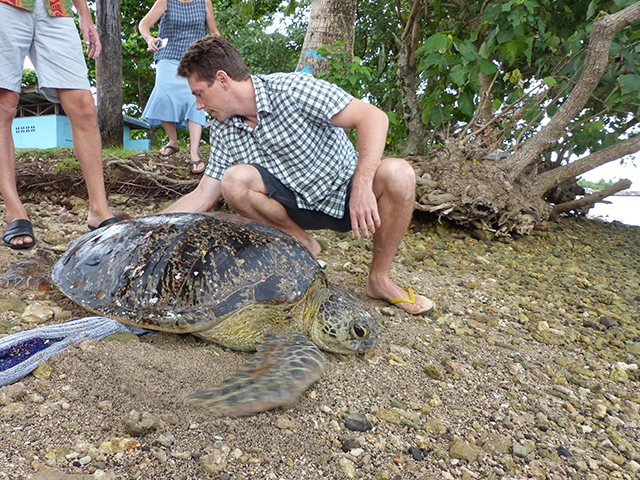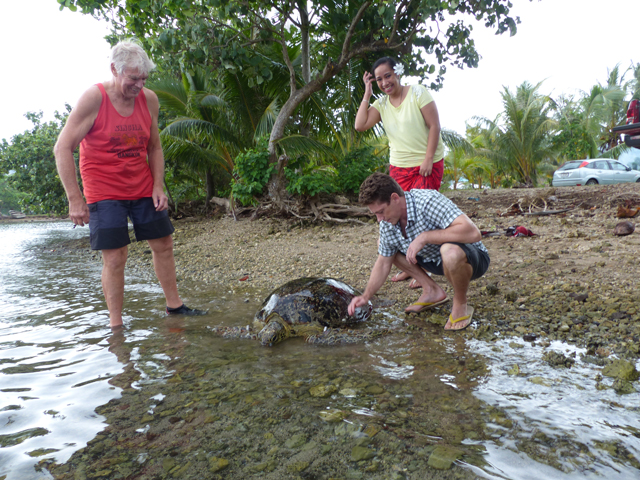
Island and Ocean Ecosystems
12 December 2014, Apia, Samoa - The latest turtle rescue and release in Samoa has prompted calls for members of the public in Samoa to report illegal activities involving the capture and sale of sea turtles.
A family of Good Samaritans contacted authorities on Thursday evening to report a live turtle for sale at a roadside stall outside Apia. Staff from Samoa's Ministry of Natural Resources and Environment (MNRE) and the Secretariat of the Pacific Regional Environment Programme (SPREP) then travelled to the location where the incident was reported and tagged the turtle before removing it to safety.

The male green sea turtle, nicknamed 'Malo', measured 910mm in shell length and was estimated to be at least 30 years of age.
Ms Juney Ward of MNRE believes that this incident presents a good opportunity to remind the public about the laws in Samoa surrounding the protection of marine turtles.
"In the lead up to Christmas, we are likely to see an increase of turtles captured to sell for their meat and shell. It's important that people understand that under the Marine Wildlife Protection Regulations 2009 and Fisheries Regulation 1996, it is illegal in Samoa to sell, catch, injure or kill turtles. It is also written in law that if you witness any such activity you must report it as soon as possible."

Mr Michael Donoghue, SPREP's Threatened and Migratory Species Advisor explains that declining turtle numbers in Samoa, and elsewhere, is a great concern:
"Turtles have always been an integral part of Pacific culture but their numbers are now at their lowest level since people arrived in the islands. Besides being taken for food, turtles are now threatened by coastal development, habitat loss, by-catch in fishing operations and climate change. If people want their grandchildren to see turtles, they will have to stop catching and eating them now or there will be no nesting turtles left on Samoa by 2030."

SPREP's Convention on Migratory Species Pacific Officer, Ms Penina Solomona, emphasised that the people who contacted authorities to report this turtle did the right thing.
"Thanks to their actions, the turtle has now been safely released. Malo has escaped death for now and hopefully he will go on to live another 30 years or more."
Serious penalties apply to people found to be illegally capturing and/or selling sea turtles in Samoa. To report illegal activity, please contact one of the organisations listed below:
A family of Good Samaritans contacted authorities on Thursday evening to report a live turtle for sale at a roadside stall outside Apia. Staff from Samoa's Ministry of Natural Resources and Environment (MNRE) and the Secretariat of the Pacific Regional Environment Programme (SPREP) then travelled to the location where the incident was reported and tagged the turtle before removing it to safety.

Above: It took four adults to carefully carry Malo from the truck to the release site.
The male green sea turtle, nicknamed 'Malo', measured 910mm in shell length and was estimated to be at least 30 years of age.
Ms Juney Ward of MNRE believes that this incident presents a good opportunity to remind the public about the laws in Samoa surrounding the protection of marine turtles.
"In the lead up to Christmas, we are likely to see an increase of turtles captured to sell for their meat and shell. It's important that people understand that under the Marine Wildlife Protection Regulations 2009 and Fisheries Regulation 1996, it is illegal in Samoa to sell, catch, injure or kill turtles. It is also written in law that if you witness any such activity you must report it as soon as possible."

Above: Malo is gently placed on the beach for release.
Mr Michael Donoghue, SPREP's Threatened and Migratory Species Advisor explains that declining turtle numbers in Samoa, and elsewhere, is a great concern:
"Turtles have always been an integral part of Pacific culture but their numbers are now at their lowest level since people arrived in the islands. Besides being taken for food, turtles are now threatened by coastal development, habitat loss, by-catch in fishing operations and climate change. If people want their grandchildren to see turtles, they will have to stop catching and eating them now or there will be no nesting turtles left on Samoa by 2030."

Above: Staff from SPREP smile as Malo enthusiastically heads for the water.
SPREP's Convention on Migratory Species Pacific Officer, Ms Penina Solomona, emphasised that the people who contacted authorities to report this turtle did the right thing.
"Thanks to their actions, the turtle has now been safely released. Malo has escaped death for now and hopefully he will go on to live another 30 years or more."
Serious penalties apply to people found to be illegally capturing and/or selling sea turtles in Samoa. To report illegal activity, please contact one of the organisations listed below:
- Fisheries Division: Phone 22561
- Division of Environment and Conservation: Phone 67200 or email [email protected]
- SPREP: Phone 21929 or email [email protected]